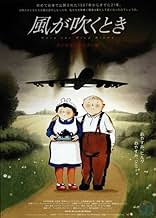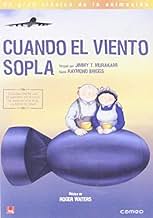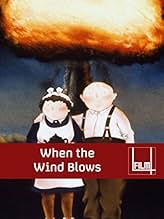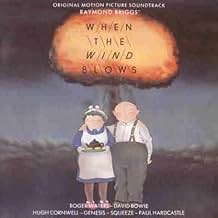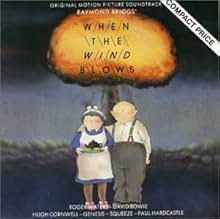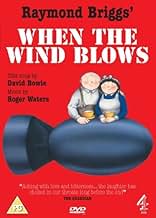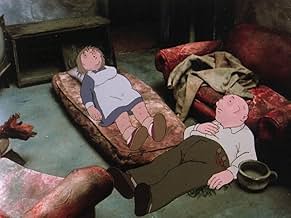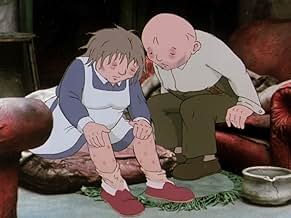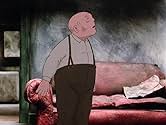Um ingênuo casal rural britânico sobrevive ao ataque inicial de uma guerra nuclear.Um ingênuo casal rural britânico sobrevive ao ataque inicial de uma guerra nuclear.Um ingênuo casal rural britânico sobrevive ao ataque inicial de uma guerra nuclear.
- Prêmios
- 1 indicação no total
- Hilda Bloggs
- (narração)
- Jim Bloggs
- (narração)
- Announcer
- (narração)
- Russian submariner
- (narração)
- Additional Voices
- (narração)
- Additional Voices
- (narração)
- Self
- (cenas de arquivo)
- (não creditado)
- Self
- (cenas de arquivo)
- (não creditado)
- Self
- (cenas de arquivo)
- (não creditado)
- Self
- (cenas de arquivo)
- (não creditado)
Avaliações em destaque
As you watch the film you are given a 'fly-on-the-wall' perspective of an elderly couple 'preparing' for a nuclear blast. Their innocence and naivety is moving whilst at the same time full of hope. They dutifully follow governmental leaflets firmly believing that the powers that be will never let them down. This viewpoint is harrowing for the viewer as we know that there is no real hope for either of them and yet still they carry on even after the blast, with a quiet dignity and bravery which is very endearing.
This is not a film with a happy ending and nor should it be. For this reason some may call it depressing but the media of film should not always be used to merely entertain.
There are few films out there that truly have the power to make an impact on us that will last the rest of our lives, thankfully When The Wind Blows is one of them. A daring and innovative movie which is so much more than just a cartoon.
It is also now available at last on DVD. I intend to order my copy very soon. Highly recommended.
This film takes a different approach: the format (animated) and the setting (rural England) perfectly match the soothing government messages: build a shelter, keep some food and drink - you'll be alright.
But then the story is continued through to the (very painful) end: there is no more government, there is no more mailman, there is
no more you....
While Mick Jackson's telemovie Threads remains the screen's most potent account of mass panic on apocalypse day, this British to-the-frame adaptation of Raymond Briggs' graphic novella is unquestionably the most humane. Say hello and wave goodbye then, to Jim and Hilda, our naive retired home counties couple who, on hearing of an imminent World War III, set about merrily obeying the ridiculous instructions from government protect and survive pamphlets. They whitewash the windows (to shield the radiation), stock up on supplies (a tin of Christmas pudding) and cheerfully anticipate a Blitz-style cosy-up sipping Olvaltine under Anderson shelters.
At first, it plays out like a black comedy - just as the bomb hits, dim Hilda goes to get the washing in - but as the insidious crackle of fall-out settles and the sickness sets in, the movie reveals its true nature: an unbearably intimate, gently accentuated tragedy with a tenacious pacifist streak. Blending 2D cells with 3D modelling, director Jimmy Murakami is technically adventurous but crucially, his connection to Briggs' material is total. In fact, with its working class nuances, droll dialogue and mundane aura , you sense that if Mike Leigh made cartoons, the results wouldn't be too far from this.
Você sabia?
- CuriosidadesDavid Bowie was originally slated to record several songs for the film but was only able to contribute the title song due to time constraints regarding his then-upcoming album "Never Let Me Down". Roger Waters contributed to most of the film's songs instead.
- Erros de gravaçãoAt the beginning of the scene in which Jim and Hilda are bedridden, Hilda's feet are missing for a few frames as the camera pans across.
- Citações
[dying of radiation poisoning]
Hilda: Shall we... pray, dear?
Jim: Pray?
Hilda: Yes.
Jim: All right then... But... to who?
Hilda: God, of course.
Jim: Oh, oh, oh, I see... Yes, yes... Would that be the correct thing?
Hilda: It can't do any harm, dear.
Jim: Ok, um... Here it goes... Dear sir...
Hilda: No, that's wrong, dear.
Jim: Well, uh... How, how do you start?
Hilda: Our God...
Jim: -our help, in ages past...
Hilda: That's it, dear. Keep it up.
Jim: Almighty and most merciful father...
Hilda: That's good.
Jim: Dearly beloved... we are gathered... unto thee. I shall fear no evil. Thy rod and thy staff comfort me all the days of my life.
[beginning to suffocate]
Jim: Lay me down in green pastures... I... I can't remember anymore.
Hilda: That was nice, dear. I liked the bit about the green pastures.
Jim: Oh, yes, yes. Into the valley of the shadow of death...
Hilda: Oh, no more love. No more.
Jim: ...rode the six hundred.
[they die]
- Cenas durante ou pós-créditosAfter the end credits, Morse code can be heard in the background. The code, when translated, means "MAD". MAD is an abbreviation for the term "Mutually Assured Destruction".
- Versões alternativasFrom the Castilian Spanish dubbing, Fernando Rey and Irene Gutiérrez Caba were cast to be the voices of the main characters.
- ConexõesFeatured in Years Ahead: Episode #5.1 (1986)
- Trilhas sonorasWhen the Wind Blows
Written by David Bowie and Erdal Kizilcay
Performed by David Bowie
Produced by David Bowie and David Richards
Principais escolhas
- How long is When the Wind Blows?Fornecido pela Alexa
Detalhes
- Data de lançamento
- País de origem
- Central de atendimento oficial
- Idioma
- Também conhecido como
- When the Wind Blows
- Empresas de produção
- Consulte mais créditos da empresa na IMDbPro
Bilheteria
- Faturamento bruto nos EUA e Canadá
- US$ 5.274
- Fim de semana de estreia nos EUA e Canadá
- US$ 3.597
- 13 de mar. de 1988
- Faturamento bruto mundial
- US$ 5.274
- Tempo de duração1 hora 24 minutos
- Cor
- Mixagem de som
- Proporção
- 1.37 : 1
Contribua para esta página



